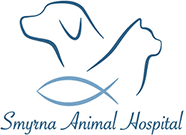Does your dog sometimes get upset if you approach him while he’s eating? This behavior, which is called food aggression, is not uncommon in our canine companions. A local Marietta, GA vet offers some information on this below.
Basics
Food aggression falls under the umbrella of resource guarding. This instinctive behavior basically boils down to Fido’s need to protect things of value: in this case, his dinner. It also plays into our canine pals’ pack mentality. In the wild, the alpha dog will always eat first. The pups that are further down in the pecking order may sometimes have to fight over the final scraps.
Causes
Food aggression can sometimes develop early on, if a puppy has to battle his siblings for nursing spots. In other cases, dogs develop this behavior after trauma, homelessness, or abuse. While any pooch can develop food aggression, it is more prevalent in breeds that have natural guarding tendencies, such as Rottweilers and German Shepherds. Pups that have spent time in shelters are also at higher risk.
Dangers
Food aggression can be very dangerous, as it can lead to biting. Of course, the level of risk will vary according to Fido’s size, temperament, and the intensity of his behavior. A German Shepherd that growls and bares his teeth if you come anywhere near him during supper is of course a much bigger threat than Mini Pinscher that grumbles if you move his bowl out of your way while he’s eating. The risks of an incident also go up when there are children involved. Little ones sometimes just don’t know any better, and may be curious about Fido’s food. Youngsters may also just want to pet or play with their furry friend at the wrong time.
What To Do
Food aggression can—and should—be addressed. Fortunately, desensitization and training will often resolve the issue. While there are different methods for this, most training programs are divided into stages. These may include things like dropping treats into Fido’s bowl, hand feeding, or using specific steps or techniques for feeding. If you have more than one dog, simply feeding them separately may help. We also recommend getting your furry pal fixed. That said, we definitely advise getting professional help. Consult your vet or a professional behaviorist.
Do you know or suspect that your dog has behavioral issues? Contact us, your local Marietta, GA animal clinic!



